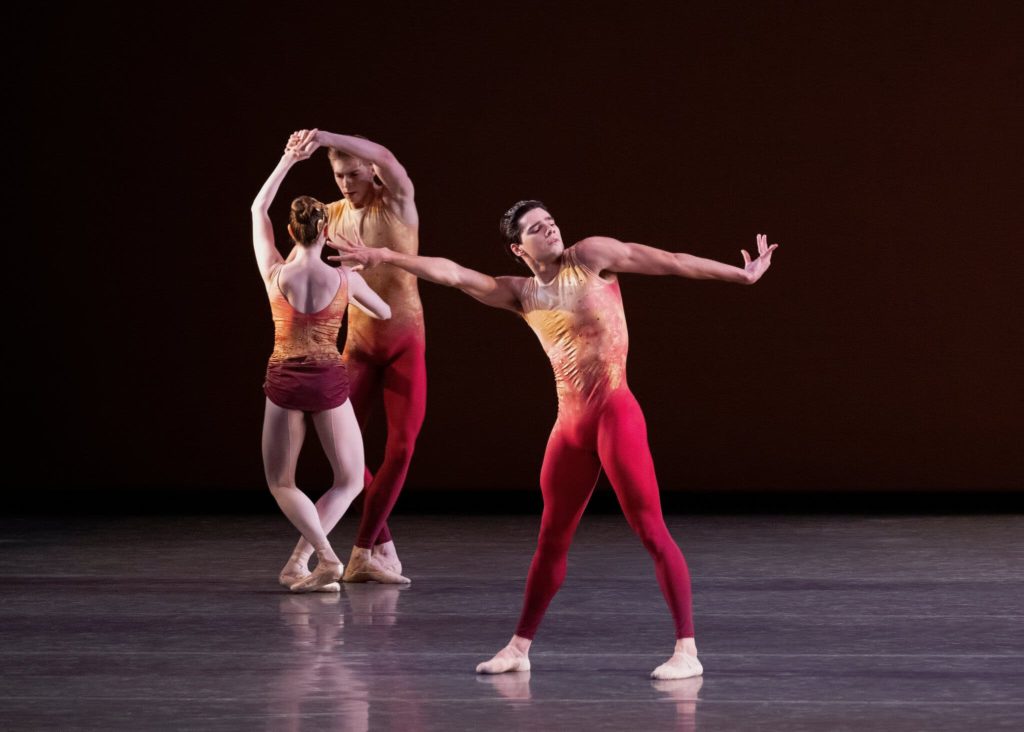VIEWPOINTS – New York City Ballet celebrates the 50th anniversary of the company’s STRAVINSKY FESTIVAL with compelling grit and determination
- By drediman
- May 9, 2022
- No Comments

This spring season, New York City Ballet celebrates the 50th anniversary of its Stravinsky Festival, which commemorates the company’s strong association with the music of Igor Stravinsky. Although various choreographers have created works set to the composer’s music for City Ballet, the collaboration between Stravinsky and George Balanchine remains paramount. Indeed, theirs is one of the great artistic partnerships of the 20th century and the bedrock of City Ballet’s vast repertoire (as well as the subject of Richard Nelson’s fascinating play Nikolai and the Others, which Lincoln Center Theater presented in 2013).
The festival – which is currently in full swing and runs through May 15 – is comprised of four discrete programs, of which I caught the first two (so far). The festival opened with a bill that seemed an homage to Stravinsky’s iconic “Firebird” score. As an appetizer, the performance commenced with New York City Ballet Orchestra’s sparkling rendition of “Fireworks”, the piece which led to the commissioning of “Firebird” by legendary impresario Serge Diaghilev. The dancing began with the pretty if unremarkable Scherzo Fantastique choreographed by Justin Peck, City Ballet’s sought-after resident choreographer. The 2016 ballet is a sort of abstraction of Balanchine’s Firebird – which of course closed out the evening – particularly with regards to its vibrant, boldly colorful sets and costumes, which are strongly reminiscent of Marc Chagall’s designs for Firebird. Tucked between these two ballets was Balanchine’s still-striking leotard ballet Symphony in Three Movements, which was choreographed for the original 1972 Stravinsky Festival.
Featuring works by three separate choreographers, the second program (which is largely the same set of ballets that comprised the company’s spring gala last Thursday) is perhaps the most eclectic bill of the festival. The evening opened with Peck’s Pulcinella Variations, in my mind one of the choreographer’s most accomplished creations, with its freshly conceived pas de deux and ensemble work, as well as its rich sense of musicality. The evening continued with Scherzo a la Russe, a charming but inconsequential divertissement performed by dancers from the School of American Ballet. The centerpiece of the evening was the world premiere of Architects of Time choreographed by Silas Farley, a former City Ballet corps member who departed the company during the pandemic. Set to music by David K. Israel, the work freely projects outwardly and breathes well on the Koch stage, although there is a noticeable lack of tension throughout that eventually finds the ballet wilting before your eyes. The program concluded with a mandatory Balanchine ballet – the iconic Stravinsky Violin Concerto.
Judging from these two programs, the evolving company is dancing admirably from a technical standpoint, although some of the dancers are still on their journey to mastering the challenging choreography (although technically proficient as the Firebird, newly-appointed soloist Isabella LaFreniere still lacks the requisite otherworldliness to make the role truly mesmerizing; principals Ashley Laracey and Unity Phelan seem to be willing Stravinsky Violin Concerto to happen as opposed to existing within it). This is no surprise given current circumstances. Indeed, apart from the recent retirements of a slew of longtime principal dancers, the company has also been noticeably hit by injuries and increasing Covid cases in the area – Sterling Hyltin, Sara Mearns, Adrian Danchig-Waring, Emily Kikta, India Bradley, and Harrison Coll were out of commission during the performances I attended (all of them were scheduled to perform). Despite these setbacks, the company – thanks to its incredibly deep bench – has valiantly found a way to perform nonetheless. Indeed, there was a strong element of grit and determination in these performances that I found compelling and inspiring.
Throughout, the company’s orchestra sounded robust, thanks largely to music director Andrew Litton, who is the primary conductor of the festival (with some assist from associate music director Andrew Sills in the latter portion of the festival). Happily, this befits a ballet festival with a focus on the music. Although this edition of the Stravinsky Festival has been intelligently curated, my one minor gripe is its somewhat conservative nature, especially on the festival’s 50th anniversary. A little added sense of occasion and fanfare – which were so winningly apparent in the Robbins Centennial in 2018 (the company’s last “big” festival) – would have been fitting and welcome.
RECOMMENDED
STRAVINSKY FESTIVAL
Dance
New York City Ballet at the David H. Koch Theater
Various running times
Through May 15

 Copyright © 2025
Copyright © 2025
Leave a Reply